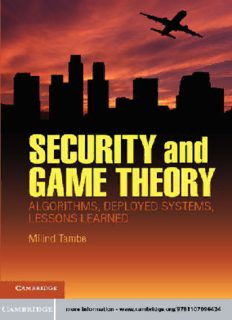Table Of ContentSecurityandGameTheory
Globalthreatsofterrorism,drug-smuggling,andothercrimeshaveledtoasignificant
increaseintheneedtodeploylimitedsecurityresourcestomaximizetheireffectiveness.
Gametheoryprovidesasoundmathematicalapproachforsucheffectivedeployment
of limited security resources. A typical resulting approach is to randomize security
schedulestoavoidpredictability,takingintoaccounttheimportanceofdifferenttargets
andpotentialadversaryreactions.
Thisbookdistillstheforefrontofthisresearchongametheoryforsecuritytoprovide
thefirstandonlystudyoflong-termdeployedapplicationsofgametheoryinthesecurity
ofkeyorganizationssuchastheLosAngelesInternationalAirportpoliceandtheU.S.
FederalAirMarshalsService.Theauthorandhisresearchgroupdrawontheirexten-
siveexperienceworkingwithsecurityofficialstointelligentlyallocatelimitedsecurity
resourcestoprotecttargets,outliningtheapplicationsoftheiralgorithmsinresearchand
therealworld.
The book also includes professional perspectives from security experts Erroll G.
Southers;LieutenantCommanderJoeDiRenzoIII,U.S.CoastGuard;LieutenantCom-
manderBenMaule,U.S.CoastGuard;CommanderErikJensen,U.S.CoastGuard;and
LieutenantFredS.BertschIV,U.S.CoastGuard.
milind tambe is a Professor of Computer Science and Industrial and Systems
Engineering at the University of Southern California (USC). His research is in the
areaofArtificialIntelligence,specificallyagent-basedandmulti-agentsystems.Heis
aFellowoftheAssociationforAdvancementofArtificialIntelligenceandrecipientof
theAssociationforComputingMachinery’sAutonomousAgentsResearchAward.He
is also the recipient of the Christopher Columbus Fellowship Foundation Homeland
SecurityAward,aspecialcommendationgivenbytheLosAngelesInternationalAir-
port’s police from the city of LosAngeles, Commander First Coast Guard District’s
OperationalExcellenceAward,theUSCViterbiSchoolofEngineering’suse-inspired
researchaward,anOkawaFoundationfacultyresearchaward,theUSCStevenB.Sample
TeachingandMentoringaward,andtheACMrecognitionofserviceaward.
Security and Game Theory
Algorithms, Deployed Systems, Lessons Learned
MILIND TAMBE
UniversityofSouthernCalifornia
cambridge university press
Cambridge,NewYork,Melbourne,Madrid,CapeTown,
Singapore,SãoPaulo,Delhi,Tokyo,MexicoCity
CambridgeUniversityPress
32AvenueoftheAmericas,NewYork,NY10013-2473,USA
www.cambridge.org
Informationonthistitle:www.cambridge.org/9781107096424
©MilindTambe2012
Thispublicationisincopyright.Subjecttostatutoryexception
andtotheprovisionsofrelevantcollectivelicensingagreements,
noreproductionofanypartmaytakeplacewithoutthewritten
permissionofCambridgeUniversityPress.
Firstpublished2012
PrintedintheUnitedStatesofAmerica
AcatalogrecordforthispublicationisavailablefromtheBritishLibrary.
LibraryofCongressCataloginginPublicationData
Tambe,Milind,1965–
Securityandgametheory:algorithms,deployedsystems,lessonslearned/MilindTambe.
p. cm.
Includesbibliographicalreferencesandindex.
ISBN978-1-107-09642-4(hardback)
1. Computersecurity. 2. Gametheory. 3. Security,International–Mathematicalmodels.
I. Title.
QA76.9.M35T362011
005.8–dc23 2011038733
ISBN978-1-107-09642-4Hardback
CambridgeUniversityPresshasnoresponsibilityforthepersistenceoraccuracyofURLsfor
externalorthird-partyInternetWebsitesreferredtointhispublicationanddoesnotguarantee
thatanycontentonsuchWebsitesis,orwillremain,accurateorappropriate.
ToSonali,Arjun,andRaam
Contents
Acknowledgments pagexiii
1 IntroductionandOverviewofSecurityGames 1
MilindTambeandManishJain
1.1 Introduction 1
1.2 Motivation:SecurityGames 3
1.3 OverviewofPartII:ApplicationsofSecurityGames 9
1.4 OverviewofPartIII:AlgorithmicAdvancesto
AchieveScale-upinSecurityGames 11
1.5 PartIV:TowardtheFuture 17
1.6 Summary 23
PART I: SECURITY EXPERTS’ PERSPECTIVES
2 LAX–TerrorTarget:TheHistory,theReason,the
Countermeasure 27
ErrollG.Southers
2.1 Introduction 27
2.2 ABriefHistoryofSignificantEvents 27
2.3 TerrorismandtheEconomicSignificanceof
theAviationDomain 34
2.4 AviationSecurity 36
2.5 LAXTerrorHistory 37
2.6 RANDStudy 39
2.7 LosAngelesWorldAirportsPolice 41
2.8 TerroristOperationalPlanningCycle 44
2.9 CREATEPilotProject 45
2.10 Summary 49
vii
viii Contents
3 MaritimeTransportationSystemSecurityandtheUseofGame
Theory:APerfectMatchtoAddressOperationalandTactical
Concerns 51
Dr.JoeDiRenzoIII,LieutenantCommanderBenMaule,Lieutenant
CommanderErikJensen,and
LieutenantFredS.BertschIV
PART II: DEPLOYED APPLICATIONS
4 DeployedARMORProtection:TheApplicationofa
Game-TheoreticModelforSecurityattheLosAngeles
InternationalAirport 67
JamesPita,ManishJain,JanuszMarecki,FernandoOrdóñez,
ChristopherPortway,MilindTambe,CraigWestern,
PraveenParuchuri,andSaritKraus
4.1 Introduction 67
4.2 RelatedWork 69
4.3 SecurityDomainDescription 70
4.4 Approach 72
4.5 SystemArchitecture 76
4.6 DesignChallenges 80
4.7 ExperimentalResults 81
4.8 Summary 86
5 IRIS–AToolforStrategicSecurityAllocationin
TransportationNetworks 88
JasonTsai,ShyamsunderRathi,ChristopherKiekintveld,
FernandoOrdóñez,andMilindTambe
5.1 Introduction 88
5.2 FederalAirMarshalService 91
5.3 Background 92
5.4 SystemArchitecture 96
5.5 MajorChallenges 98
5.6 OrganizationalAcceptance 100
5.7 ExperimentalResults 102
5.8 Summary 104
6 GUARDS:Game-TheoreticSecurityAllocation
onaNationalScale 107
JamesPita,MilindTambe,ChristopherKiekintveld,
ShaneCullen,andErinSteigerwald
Contents ix
6.1 Introduction 107
6.2 Background 109
6.3 NationalDeploymentChallenges 111
6.4 SystemArchitecture 118
6.5 Evaluation 119
6.6 LessonsinTransitioningResearchintoPractice 124
6.7 RelatedWorkandSummary 125
PART III: EFFICIENT ALGORITHMS FOR
MASSIVE SECURITY GAMES
7 CoordinatingRandomizedPoliciesforIncreasingthe
SecurityofAgentSystems 131
PraveenParuchuri,JonathanP.Pearce,JanuszMarecki,
MilindTambe,FernandoOrdóñez,andSaritKraus
7.1 Introduction 131
7.2 RelatedWork 134
7.3 RandomizationwithNoAdversaryModel 135
7.4 RandomizationUsingaPartialAdversaryModel 140
7.5 ExperimentalResults 147
7.6 ConclusionsandPolicyImplications 153
8 ComputingOptimalRandomizedResourceAllocations
forMassiveSecurityGames 156
ChristopherKiekintveld,ManishJain,JasonTsai,JamesPita,
FernandoOrdóñez,andMilindTambe
8.1 Introduction 156
8.2 Game-TheoreticModelingofSecurityGames 157
8.3 MotivatingDomains 159
8.4 ACompactRepresentationforMultipleResources 161
8.5 ExploitingPayoffStructure 165
8.6 SchedulingandResourceConstraints 169
8.7 ExperimentalEvaluation 171
8.8 Conclusion 175
9 SecurityGameswithArbitrarySchedules:ABranch-
and-PriceApproach 177
ManishJain,ErimKardes¸,ChristopherKiekintveld,
MilindTambe,andFernandoOrdóñez
9.1 Introduction 177
9.2 SPARS 178
Description:Global threats of terrorism, drug-smuggling, and other crimes have led to a significant increase in research on game theory for security. Game theory provides a sound mathematical approach to deploy limited security resources to maximize their effectiveness. A typical approach is to randomize securi

